新概念英语第二册期末复习——形容词课件(共41张PPT)
文档属性
| 名称 | 新概念英语第二册期末复习——形容词课件(共41张PPT) |  | |
| 格式 | pptx | ||
| 文件大小 | 885.2KB | ||
| 资源类型 | 教案 | ||
| 版本资源 | 新概念英语 | ||
| 科目 | 英语 | ||
| 更新时间 | 2024-11-24 21:51:32 | ||
图片预览

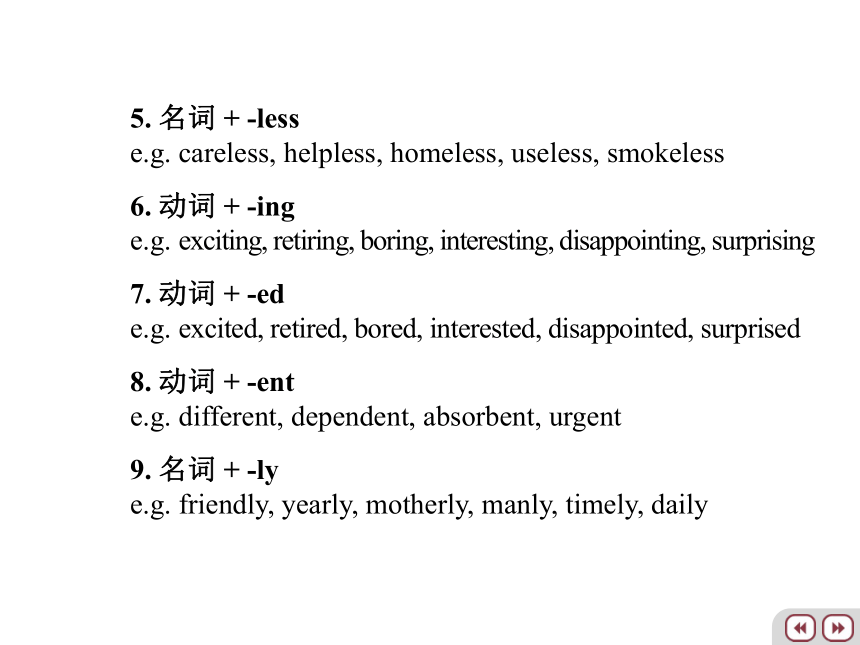
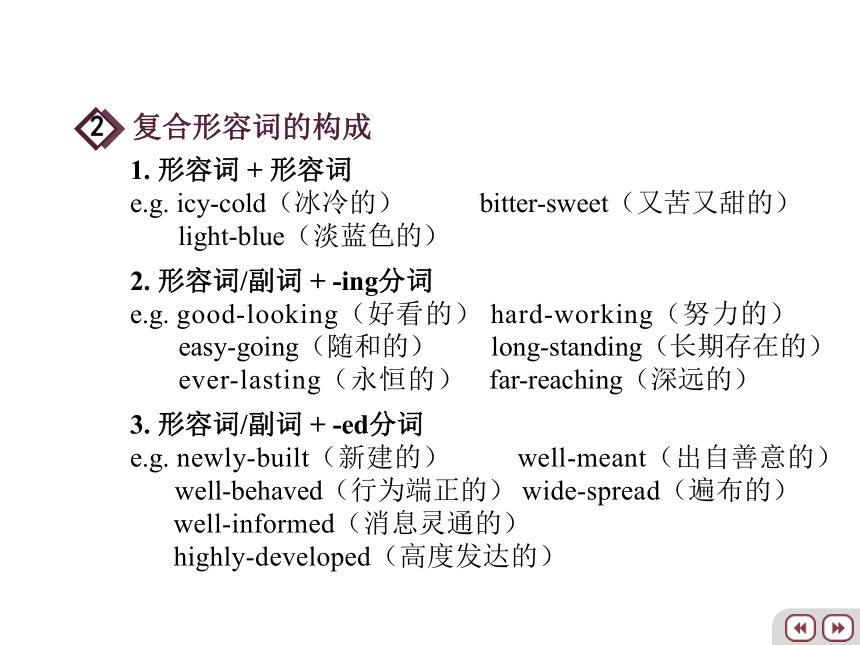
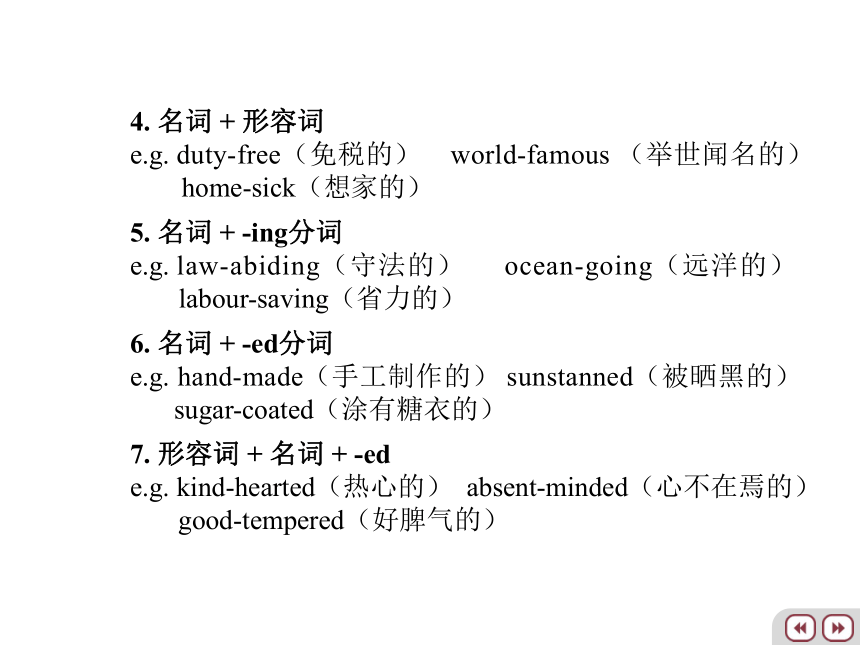
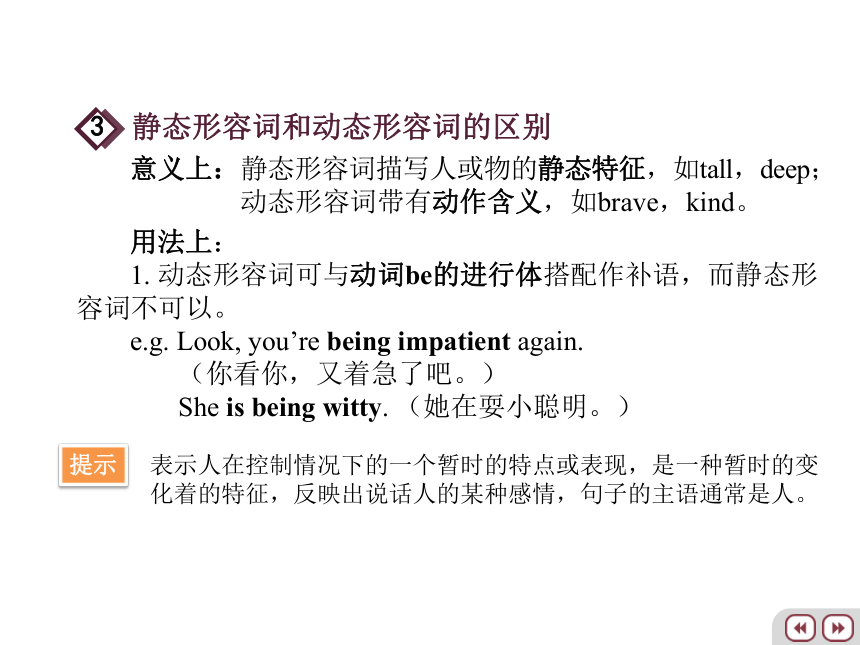
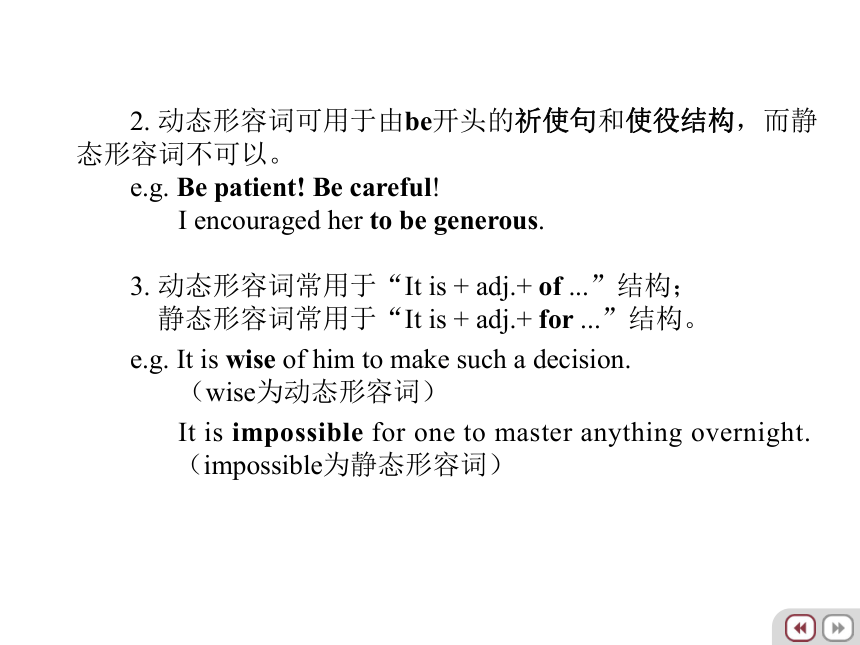
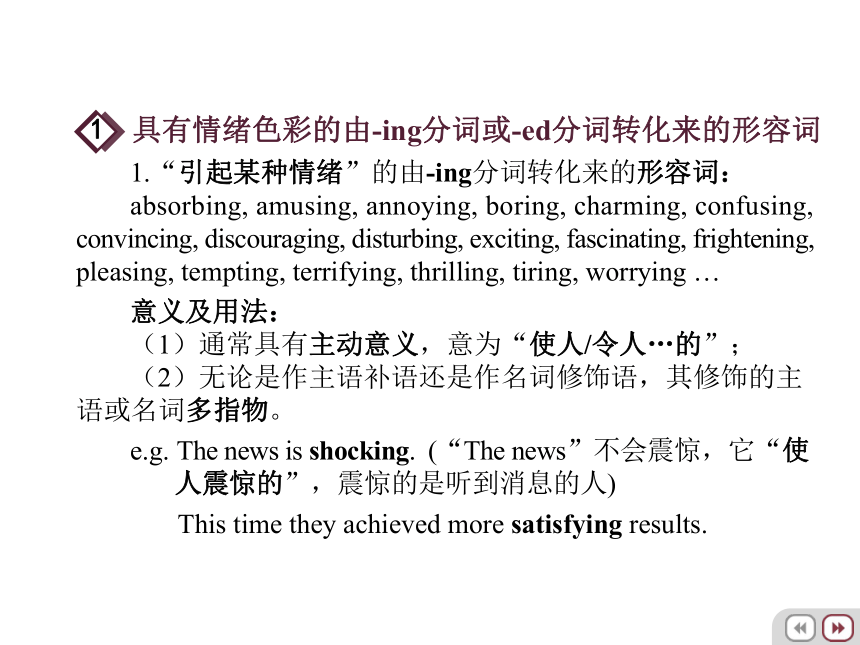
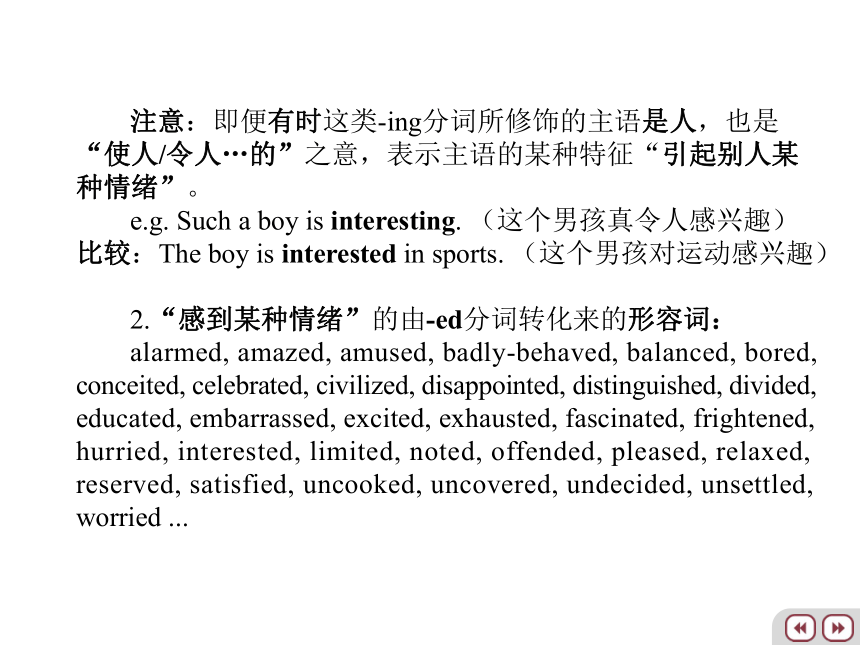
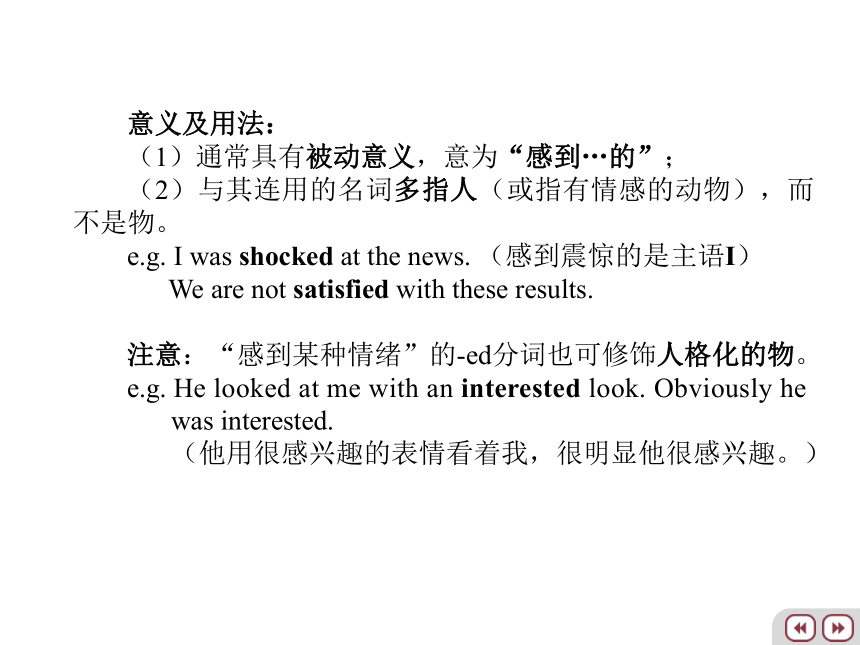
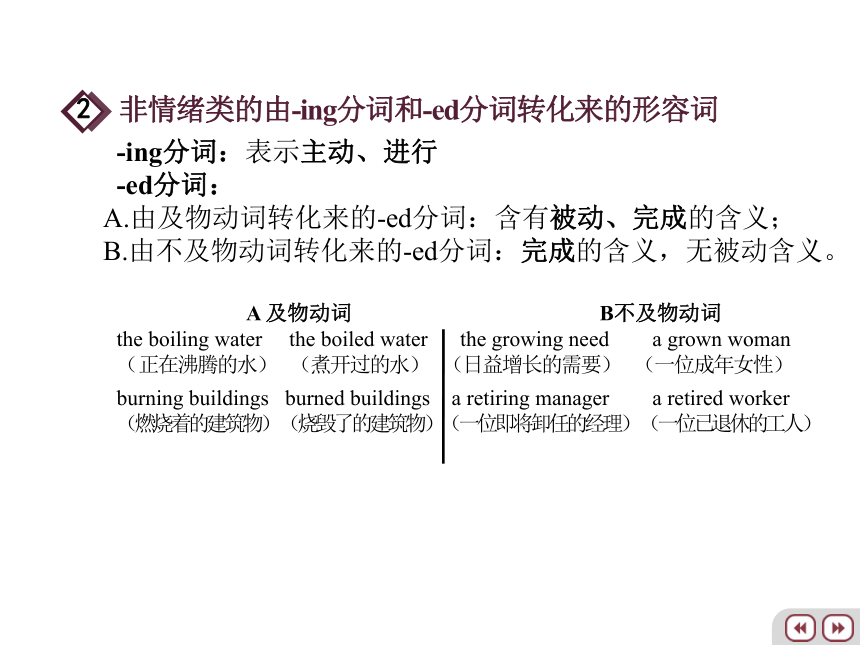
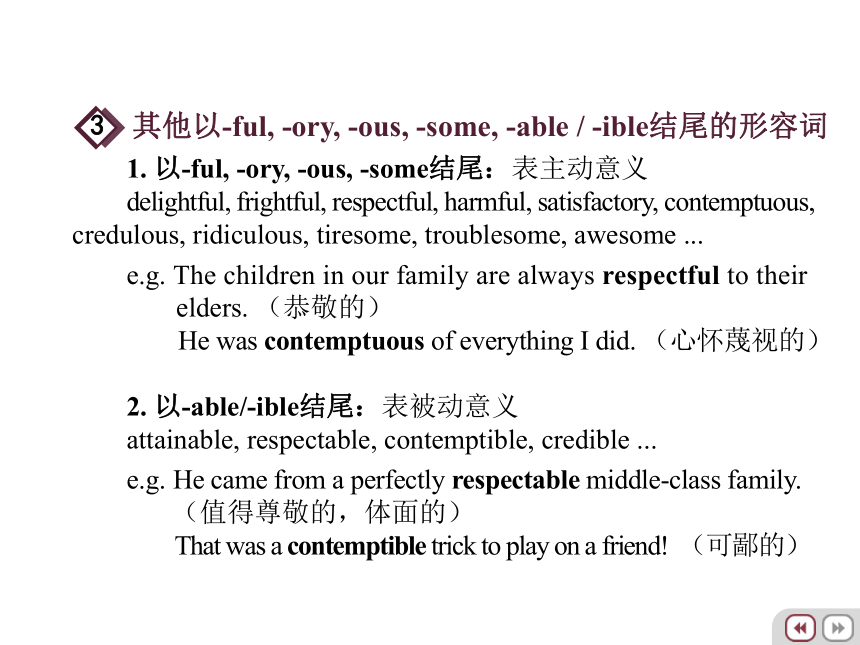
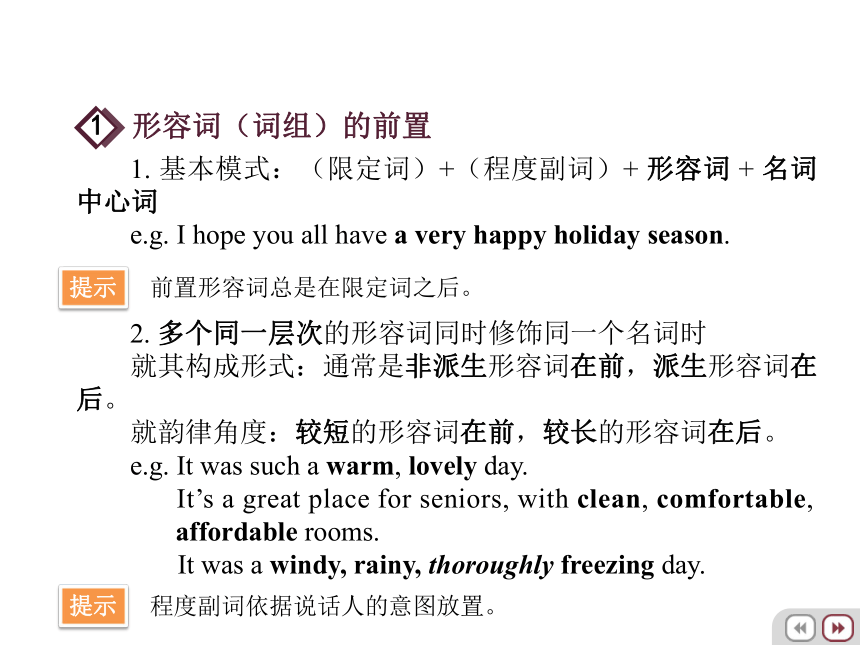
文档简介
(共41张PPT)
1. 动词 + -able
e.g. drinkable, imaginable, enjoyable, suitable, agreeable,
favourable, dependable, breakable
2. 名词/动词 + -ful
e.g. helpful, successful, powerful, careful, truthful, hopeful,
colourful, plentiful, forgetful
3. 名词 + -ous
e.g. famous, joyous, dangerous, mysterious, nervous, ridiculous,
momentous
4. 名词 + -y
e.g. cloudy, windy, sunny, rainy, snowy, sleepy, lucky, funny,
noisy, healthy
派生形容词的常见构成
1
5. 名词 + -less
e.g. careless, helpless, homeless, useless, smokeless
6. 动词 + -ing
e.g. exciting, retiring, boring, interesting, disappointing, surprising
7. 动词 + -ed
e.g. excited, retired, bored, interested, disappointed, surprised
8. 动词 + -ent
e.g. different, dependent, absorbent, urgent
9. 名词 + -ly
e.g. friendly, yearly, motherly, manly, timely, daily
1. 形容词 + 形容词
e.g. icy-cold(冰冷的) bitter-sweet(又苦又甜的)
light-blue(淡蓝色的)
2. 形容词/副词 + -ing分词
e.g. good-looking(好看的) hard-working(努力的)
easy-going(随和的) long-standing(长期存在的)
ever-lasting(永恒的) far-reaching(深远的)
3. 形容词/副词 + -ed分词
e.g. newly-built(新建的) well-meant(出自善意的)
well-behaved(行为端正的) wide-spread(遍布的)
well-informed(消息灵通的)
highly-developed(高度发达的)
复合形容词的构成
2
4. 名词 + 形容词
e.g. duty-free(免税的) world-famous (举世闻名的)
home-sick(想家的)
5. 名词 + -ing分词
e.g. law-abiding(守法的) ocean-going(远洋的)
labour-saving(省力的)
6. 名词 + -ed分词
e.g. hand-made(手工制作的) sunstanned(被晒黑的)
sugar-coated(涂有糖衣的)
7. 形容词 + 名词 + -ed
e.g. kind-hearted(热心的) absent-minded(心不在焉的)
good-tempered(好脾气的)
意义上:静态形容词描写人或物的静态特征,如tall,deep;
动态形容词带有动作含义,如brave,kind。
用法上:
1. 动态形容词可与动词be的进行体搭配作补语,而静态形容词不可以。
e.g. Look, you’re being impatient again.
(你看你,又着急了吧。)
She is being witty. (她在耍小聪明。)
静态形容词和动态形容词的区别
3
表示人在控制情况下的一个暂时的特点或表现,是一种暂时的变化着的特征,反映出说话人的某种感情,句子的主语通常是人。
提示
2. 动态形容词可用于由be开头的祈使句和使役结构,而静态形容词不可以。
e.g. Be patient! Be careful!
I encouraged her to be generous.
3. 动态形容词常用于“It is + adj.+ of ...”结构;
静态形容词常用于“It is + adj.+ for ...”结构。
e.g. It is wise of him to make such a decision.
(wise为动态形容词)
It is impossible for one to master anything overnight.
(impossible为静态形容词)
1.“引起某种情绪”的由-ing分词转化来的形容词:
absorbing, amusing, annoying, boring, charming, confusing, convincing, discouraging, disturbing, exciting, fascinating, frightening, pleasing, tempting, terrifying, thrilling, tiring, worrying …
意义及用法:
(1)通常具有主动意义,意为“使人/令人…的”;
(2)无论是作主语补语还是作名词修饰语,其修饰的主语或名词多指物。
e.g. The news is shocking. (“The news”不会震惊,它“使
人震惊的”,震惊的是听到消息的人)
This time they achieved more satisfying results.
具有情绪色彩的由-ing分词或-ed分词转化来的形容词
1
注意:即便有时这类-ing分词所修饰的主语是人,也是“使人/令人…的”之意,表示主语的某种特征“引起别人某种情绪”。
e.g. Such a boy is interesting. (这个男孩真令人感兴趣) 比较:The boy is interested in sports. (这个男孩对运动感兴趣)
2.“感到某种情绪”的由-ed分词转化来的形容词:
alarmed, amazed, amused, badly-behaved, balanced, bored, conceited, celebrated, civilized, disappointed, distinguished, divided, educated, embarrassed, excited, exhausted, fascinated, frightened, hurried, interested, limited, noted, offended, pleased, relaxed, reserved, satisfied, uncooked, uncovered, undecided, unsettled, worried ...
意义及用法:
(1)通常具有被动意义,意为“感到…的”;
(2)与其连用的名词多指人(或指有情感的动物),而不是物。
e.g. I was shocked at the news. (感到震惊的是主语I)
We are not satisfied with these results.
注意:“感到某种情绪”的-ed分词也可修饰人格化的物。
e.g. He looked at me with an interested look. Obviously he
was interested.
(他用很感兴趣的表情看着我,很明显他很感兴趣。)
-ing分词:表示主动、进行
-ed分词:
A.由及物动词转化来的-ed分词:含有被动、完成的含义;
B.由不及物动词转化来的-ed分词:完成的含义,无被动含义。
A 及物动词 B不及物动词
the boiling water the boiled water the growing need a grown woman
(正在沸腾的水) (煮开过的水) (日益增长的需要) (一位成年女性)
burning buildings burned buildings a retiring manager a retired worker
(燃烧着的建筑物) (烧毁了的建筑物)(一位即将卸任的经理) (一位已退休的工人)
非情绪类的由-ing分词和-ed分词转化来的形容词
2
1. 以-ful, -ory, -ous, -some结尾:表主动意义
delightful, frightful, respectful, harmful, satisfactory, contemptuous, credulous, ridiculous, tiresome, troublesome, awesome ...
e.g. The children in our family are always respectful to their
elders. (恭敬的)
He was contemptuous of everything I did. (心怀蔑视的)
2. 以-able/-ible结尾:表被动意义
attainable, respectable, contemptible, credible ...
e.g. He came from a perfectly respectable middle-class family.
(值得尊敬的,体面的)
That was a contemptible trick to play on a friend! (可鄙的)
其他以-ful, -ory, -ous, -some, -able / -ible结尾的形容词
3
1. 基本模式:(限定词)+(程度副词)+ 形容词 + 名词中心词
e.g. I hope you all have a very happy holiday season.
2. 多个同一层次的形容词同时修饰同一个名词时
就其构成形式:通常是非派生形容词在前,派生形容词在后。
就韵律角度:较短的形容词在前,较长的形容词在后。
e.g. It was such a warm, lovely day.
It’s a great place for seniors, with clean, comfortable,
affordable rooms.
It was a windy, rainy, thoroughly freezing day.
形容词(词组)的前置
1
前置形容词总是在限定词之后。
提示
程度副词依据说话人的意图放置。
提示
3. 多个不同层次的形容词同时修饰同一个名词时
总的顺序原则:“主观评价的形容词+客观测度的形容词”
客观测度形容词的顺序:
①大小、长短、高低 ②形状 ③年龄、新旧
④颜色 ⑤国籍、地区、出处 ⑥物质、材料
⑦用途、类别 名词中心词。
e.g. a charming small round old brown French oak writing desk
主观评价 大小 形状 新旧 颜色 国别 材料 用途
根据认知语言学中的距离象似性原则,越是表现事物本质属性的修饰语越靠近中心词,非事物本质属性的修饰语则离中心词较远。
提示
1. 被修饰的中心词由-thing, -one, -body等结尾的复合代词时,形容词须后置
e.g. At the first step Buck’s feet went into something soft and
white.
Danny shared his knowledge freely with anyone interested.
We propose that somebody neutral take the chair.
2. 当形容词本身带有后置修饰语或补足成分,从而构成较长的形容词词组时,通常后置
e.g. Students brave enough to take the course deserve to
succeed. (= who are brave enough ...)
It was a conference fruitful of results.
(= which is fruitful of results)
They have a house larger than yours.
(= which is larger than yours)
形容词(词组)的后置
2
3. 某些以前缀a-开首的补语形容词用作后置修饰语
e.g. He is the richest man alive. (= that is alive)
The house ablaze is next door to mine.
(= which is ablaze)
Opportunity alone is not enough to create success.
(= which is alone)
这类形容词也能用作补语。
这类形容词词组在意义上相当于关系分句。
提示1
提示2
这类形容词在意义上相当于关系分句。
提示
4. 某些固定搭配中
e.g. a court martial (军事法庭)
the sum total (总数)
an attorney general (司法部长)
the city of London proper (伦敦市区)
the president elect (当选总统)
结构形式:(修饰语)+ 形容词 +(后置修饰语/补足成分)
用作补语:主语补语、宾语补语
e.g. The cottage he has rented is very delightful. (SVC)
He found the cottage very delightful. (SVOC)
形容词补足成分:介词词组、动词不定式、that-分句
形容词词组
1
1. “形容词+介词词组”充当主语补语
e.g. He was absent from the meeting.
S V C
He remained faithful to his friend.
S V C
形容词 + 介词词组
2
更多搭配:accustomed to, blind to, close to, dear to, equal to, inferior to, superior to, true to, afraid of, ashamed of, proud of, confident of, sick of, sure of, tired of, worthy of, astonished at, good at, experienced in, weak in, busy with, content with, dependent on, keen on, different from, worried about ...
2. 少数形容词只有在与特定的介词词组搭配后才能作主语补语,否则句意不完整
e.g. * I’m very fond. (×)
I’m very fond of classical music. (√)
需要记忆特定形容词与介词的搭配。
绝大多数形容词都可单独作补语。
提示1
提示2
1. “形容词 + that-分句”充当主语补语
e.g. He is confident (that) he will be able to pass the exam.
S V C
更多:sure, certain, glad, pleased, happy, proud, amazed, surprised, astonished, shocked, disappointed, sorry, sad, annoyed, alarmed ...
2. 有些可以转换为“形容词+介词词组”或“形容词+不定式”
e.g. I’m sure that you will get success.
=You are sure of success.
=You are sure to get success / to succeed.
形容词+ that-分句
3
此类形容词数量有限,多表情绪和心理状态。
提示
主要语法特征:常带定冠词;中心词带有形容词和名词的某些特点。
1. The + 表人的特征的形容词,泛指一类人
e.g. The young have a whole life before them.
The extremely old need a great deal of attention.
更多:blind, brave, dead, deaf, dumb, guilty, innocent, poor, rich, sick, wise, unemployed, injured, living, wounded ...
注意:少数几个-ed分词也可用作单数,指个别人。
e.g. The accused (被告) was found guilty.
The departed (死者) was a good friend of mine.
形容词作名词词组中心词
1
这类结构作主语时多数用作复数,谓语动词用复数。
提示
2. The + 表国籍的形容词,泛指一类人
e.g. The Chinese are industrious and peace-loving people.
(指The Chinese people)
The English like to be with their families at Christmas.
3. The + 表抽象概念的形容词,表示抽象概念
e.g. The unknown is bound to happen in the study of the
outer space.
The beautiful is not always the same as the good.
这类国籍多以-sh,-ch,-ese结尾。
提示
这类结构作主语时谓语动词用单数。
提示
4. 某些固定搭配中
e.g. The dock was now at its busiest. (最繁忙的时候)
It shows the writer at his best and liveliest. (鼎盛时期)
“at +物主限定词+形容词最高级结构”中形容词起着名词词组中心词的作用。
提示
无动词分句作状语:表达时间、原因、让步、方式或伴随状况等。
e.g. Ripe, these apples will be sweet. (表时间)
=When they are ripe, these apples will be sweet.
At last, tired and unhappy, Alice sat down on the floor
and cried. (表原因)
He went back to his homeland, empty-handed.
(表伴随状况)
Right or wrong, I’ll be with you. (表让步)
形容词词组作无动词分句
2
无动词分句是一种省略了主语和谓语动词的分句结构,就其深层结构来说大多属于SVC句型。
形容词词组作无动词分句,通常是对主语进行解释,可放在句首、句中、句末,放在句末时强调意味最突出。
提示1
提示2
At ____________, photography is a chemical process, during which a light-sensitive material is altered when exposed to light.
A.
B.
C.
D.
its most basic
its basic
the most basic
the basic
该题主要考查固定搭配“at +物主限定词+形容词最高级结构”中形容词作名词中心词的用法。表达“从根本上说;究其根本”,可以用at its most basic或者at its most basic level,相当于fundamentally。因此A为正确答案。该固定搭配中形容词实际起着名词词组中心词的作用。另外,该类搭配还可以理解为省略名词中心词,《教程》P431页提到省略名词中心词的现象,如:“The season is now at its loveliest.”。
究其根本,摄影是一种化学变化过程,在此过程中,感光材料被暴露于光线下就会发生改变。
She was once a young country wife with chickens in the backyard and a view of _________ mountains behind the apple orchard.
A.
B.
C.
D.
Virginia blue hazy
Virginia hazy blue
hazy blue Virginia
blue hazy Virginia
该题考查形容词的排列顺序问题。当几个属于不同层级的形容词共同修饰一个名词时,通常排列顺序为:表示说话人评价的形容词→表示大小、形状、新旧的形容词→表示颜色的形容词→表示国别、来源、材料的形容词→表示用途或目的的形容词或分词、名词等类别词。按照这个顺序,hazy(形状)、blue(颜色)、Virginia(来源),因此C为正确答案。
她从前是一个年轻的乡村已婚妇女,在后院里养着鸡,放眼望去可以看到苹果园后面那薄雾缭绕的蓝色弗吉尼亚山脉。
Jack ________ from home for two days now, and I am beginning to worry about his safety.
A.
B.
C.
D.
has been missing
has been missed
had been missing
was missed
该题考查形容词missing及现在完成体的用法。由句中的时间状语“for two days now”可知,这里应该用现在完成体;missing为由-ing分词转化来的形容词(参见《教程》P260),表示“失踪”的状态,A项has been missing表示动作从过去某一时间一直持续到现在的状态,因此选A。
杰克到现在已经有两天没回家了。我开始为他的安全担心起来。
本讲主要介绍了形容词的类别、形容词与分词、形容词词组的构成及用法。熟悉派生形容词及复合形容词的构成方式有助于扩大词汇量,动态形容词和静态形容词在用法上的区别主要与两者的意义有关。由-ing分词转化来的形容词通常带有主动意义,而由及物动词的-ed分词转化来的形容词则通常带有被动意义,以-ful,-ous,-some结尾的形容词也含有主动意义,以-able / -ible结尾的形容词则有被动意义。作为名词修饰语,形容词通常前置,当多个同一层次的形容词同时修饰一个名词时,一般是较长的形容词列后。当多个不同层次的形容词同时修饰一个名词时,总的顺序是“主观评价的形容词”先于“客观测度的形容词”,“客观测度形容词”的顺序可根据认知语言学中距离象似性原则来学习,
越是表现事物本质属性的修饰语越靠近中心词。凡能作后置修饰语的形容词或形容词词组,其含义往往相当于一个关系分句。前置形容词(词组)与中心词的结构紧密,表示该中心词较永久的特征;后置形容词(词组)则表示中心词暂时的特征。作补语的形容词词组可以是“形容词+介词词组”,可以是“形容词+不定式”,也可以是“形容词+ that-分句”。有些形容词与定冠词搭配,可以表示同一类人或抽象概念。形容词词组还可用作无动词分句作状语,表达时间、原因、让步、方式或伴随状况等,这种用法多见于正式语体。
1.0
2.
0
3.0
4.
5.
6.
The teacher favoured my applying for a scholarship. His opinion is __________.
There are plenty of apples. The harvest has been _________ this year.
She was in a tremendous hurry to catch the train. We had a ________ conversation before she left the house.
The children are full of mischief, seeking to attract attention. Tommy was particularly ____________.
You look as though you need a rest. I suggest a ________ vacation in the country.
The flood was a disaster. The loss of the crops was _________.
favourable
plentiful
hurried
mischievous
restful
disastrous
7.0
8.
9.
10.
11.
12.
I prefer buying vegetables that are protected by a package. Do you have any __________ tomatoes
He had a reputation for courtesy. His behaviour was always _________, even when he was annoyed.
You’re always forgetting your assignment. You’re a very ________ person.
I would prefer to spend the winter in Florida. Anything would be ____________ to this cold weather.
I’ve been reading a mystery story. Many __________ events took place in it.
Give me all the details. I need a ________ description of your experiment.
packaged
courteous
forgetful
preferable
mysterious
detailed
13.0
14.
15.
The teacher noticed that the student was becoming nervous. His nervous behaviour was __________.
The guard was given a medal for his courage in the face of danger. He was a ____________ soldier.
He seldom asks for help. He is very ___________.
noticeable
courageous
independent
1.0
2.
0
3.
4.
5.
6.
Dick is more cautious than is necessary. He is ____________.
The expedition had plenty of equipment. It was a ____________ expedition.
They loaded too much coal on the truck. It was ___________.
The child’s eyes were filled with tears. His _________ eyes looked around for sympathy.
The house had been battered by the storm. The ____________ house needed repairs.
Henry gets his information from various sources. He is ____________.
over-cautious
well-equipped
overloaded
tear-filled
storm-battered
well-informed
7.0
8.
0
9.
0
10.
The Queen rides in a carriage drawn by six grey horses. The ____________ carriage is covered with gold.
The school desk was stained with ink. The __________ desk was a reminder of all the schoolboys who had used it.
The movie star was tall and blonde, with blue eyes. _____________ blondes are considered very attractive.
Grief at the death of Lincoln struck everyone’s heart. The ______________ people mourned their hero.
horse-drawn
ink-stained
Blue-eyed
grief-stricken
1.0
2.0
3.
4.
People were most astonished by that story.
The children behaved themselves well.
In the room there were many faces that looked bored.
This report encourages us very much.
Rewrite the following sentences, using an –ing form or –ed form as a premodifier in the noun phrase.
That was a most astonishing story.
They were well-behaved children.
There were many bored faces in the room.
This is a very encouraging report.
5.
0
6.
7.
8.
People did not at all expect that kind of result.
These circumstances really worry us very much.
A writer people know well has adopted Sheila as his daughter.
He gave a lecture that bored all of us.
That was a totally unexpected result.
These are very worrying circumstances.
Sheila is the adopted daughter of a well-known writer.
He gave a boring lecture.
1.0
2.0
3.
4.
5.
We ate in the __________________ restaurant. (new, unusual, Chinese)
Mrs Brown has _______________________________ ____________________children. (three, very intelligent, healthy)
This office is equipped with _______________ furniture. (oak, black, new)
__________________________ carvings were donated to the museum. (original, twenty, wood, African)
A _______________________ sunset filled the sky. (beautiful, pink, pale, really)
unusual new Chinese
three very healthy, intelligent / three healthy, very intelligent
new black oak
Twenty original African wood
really beautiful pale pink
6.0
7.
8.
9.
10.
Who lives in that ___________________ house (new, big, classical-style)
That restaurant serves __________________________ ___________ wine. (French, delicious, white)
I have kept my ___________________ car for twenty years. (large, Japanese, black)
There are _____________________________ chairs in the living room. (dark, three, very, comfortable, blue)
The farmers have requested a (n) ____________________ laboratory. (agricultural, small, modern)
big, new classical-style
delicious white French / delicious French white
large black Japanese
three very comfortable dark blue
small modern agricultural
1.0
2.0
3.
4.
The way she treated her servants annoyed him.
Etiquette (礼节) obviously did not bother him.
The reception they gave him did not content him.
You do not disappoint me.
Transform each of the sentences below so as to produce a subject complement consisting of a participial adjective + prepositional phrase, avoiding by whenever possible.
He was annoyed at the way she treated her servants.
He was obviously not bothered with etiquette.
He was not contented with the reception they gave him.
I am not disappointed in / with you.
5.
0
6.
7.
8.
Roger found everything around him fascinating.
Hunting had already interested him.
His progress completely satisfied her.
His conduct would have surprised his old father.
Roger was fascinated by everything around him.
He was already interested in hunting.
She was completely satisfied with his progress.
His old father would have been surprised at his conduct.
1.0
2.0
3.
4.
You have made a serious error. We are afraid (that is so).
Why did you behave in that way I’m ashamed.
Why do you feel so offended We are concerned (about that).
You see our point of view at last. We’re delighted.
Combine each pair of sentences to one single sentence containing an adjective complemented by a that- clause, omitting what is in brackets.
We are afraid that you have made a serious error.
I’m ashamed that you should have behaved in that way.
We are concerned that you should feel so offended.
We’re delighted that you see our point of view at last.
5.
0
6.
7.
8.
You must have complete trust in us. It is essential.
We shall have no more travelling. That is a great relief to us.
I may not be able to come with you. I’m not sure yet.
Don’t you know your programme I’m surprised.
It is essential that you should have complete trust in us.
We are greatly relieved that we shall have no more travelling.
I’m not sure yet that I’ll be able to come with you.
I’m surprised (that) you don’t know your programme.
1. 动词 + -able
e.g. drinkable, imaginable, enjoyable, suitable, agreeable,
favourable, dependable, breakable
2. 名词/动词 + -ful
e.g. helpful, successful, powerful, careful, truthful, hopeful,
colourful, plentiful, forgetful
3. 名词 + -ous
e.g. famous, joyous, dangerous, mysterious, nervous, ridiculous,
momentous
4. 名词 + -y
e.g. cloudy, windy, sunny, rainy, snowy, sleepy, lucky, funny,
noisy, healthy
派生形容词的常见构成
1
5. 名词 + -less
e.g. careless, helpless, homeless, useless, smokeless
6. 动词 + -ing
e.g. exciting, retiring, boring, interesting, disappointing, surprising
7. 动词 + -ed
e.g. excited, retired, bored, interested, disappointed, surprised
8. 动词 + -ent
e.g. different, dependent, absorbent, urgent
9. 名词 + -ly
e.g. friendly, yearly, motherly, manly, timely, daily
1. 形容词 + 形容词
e.g. icy-cold(冰冷的) bitter-sweet(又苦又甜的)
light-blue(淡蓝色的)
2. 形容词/副词 + -ing分词
e.g. good-looking(好看的) hard-working(努力的)
easy-going(随和的) long-standing(长期存在的)
ever-lasting(永恒的) far-reaching(深远的)
3. 形容词/副词 + -ed分词
e.g. newly-built(新建的) well-meant(出自善意的)
well-behaved(行为端正的) wide-spread(遍布的)
well-informed(消息灵通的)
highly-developed(高度发达的)
复合形容词的构成
2
4. 名词 + 形容词
e.g. duty-free(免税的) world-famous (举世闻名的)
home-sick(想家的)
5. 名词 + -ing分词
e.g. law-abiding(守法的) ocean-going(远洋的)
labour-saving(省力的)
6. 名词 + -ed分词
e.g. hand-made(手工制作的) sunstanned(被晒黑的)
sugar-coated(涂有糖衣的)
7. 形容词 + 名词 + -ed
e.g. kind-hearted(热心的) absent-minded(心不在焉的)
good-tempered(好脾气的)
意义上:静态形容词描写人或物的静态特征,如tall,deep;
动态形容词带有动作含义,如brave,kind。
用法上:
1. 动态形容词可与动词be的进行体搭配作补语,而静态形容词不可以。
e.g. Look, you’re being impatient again.
(你看你,又着急了吧。)
She is being witty. (她在耍小聪明。)
静态形容词和动态形容词的区别
3
表示人在控制情况下的一个暂时的特点或表现,是一种暂时的变化着的特征,反映出说话人的某种感情,句子的主语通常是人。
提示
2. 动态形容词可用于由be开头的祈使句和使役结构,而静态形容词不可以。
e.g. Be patient! Be careful!
I encouraged her to be generous.
3. 动态形容词常用于“It is + adj.+ of ...”结构;
静态形容词常用于“It is + adj.+ for ...”结构。
e.g. It is wise of him to make such a decision.
(wise为动态形容词)
It is impossible for one to master anything overnight.
(impossible为静态形容词)
1.“引起某种情绪”的由-ing分词转化来的形容词:
absorbing, amusing, annoying, boring, charming, confusing, convincing, discouraging, disturbing, exciting, fascinating, frightening, pleasing, tempting, terrifying, thrilling, tiring, worrying …
意义及用法:
(1)通常具有主动意义,意为“使人/令人…的”;
(2)无论是作主语补语还是作名词修饰语,其修饰的主语或名词多指物。
e.g. The news is shocking. (“The news”不会震惊,它“使
人震惊的”,震惊的是听到消息的人)
This time they achieved more satisfying results.
具有情绪色彩的由-ing分词或-ed分词转化来的形容词
1
注意:即便有时这类-ing分词所修饰的主语是人,也是“使人/令人…的”之意,表示主语的某种特征“引起别人某种情绪”。
e.g. Such a boy is interesting. (这个男孩真令人感兴趣) 比较:The boy is interested in sports. (这个男孩对运动感兴趣)
2.“感到某种情绪”的由-ed分词转化来的形容词:
alarmed, amazed, amused, badly-behaved, balanced, bored, conceited, celebrated, civilized, disappointed, distinguished, divided, educated, embarrassed, excited, exhausted, fascinated, frightened, hurried, interested, limited, noted, offended, pleased, relaxed, reserved, satisfied, uncooked, uncovered, undecided, unsettled, worried ...
意义及用法:
(1)通常具有被动意义,意为“感到…的”;
(2)与其连用的名词多指人(或指有情感的动物),而不是物。
e.g. I was shocked at the news. (感到震惊的是主语I)
We are not satisfied with these results.
注意:“感到某种情绪”的-ed分词也可修饰人格化的物。
e.g. He looked at me with an interested look. Obviously he
was interested.
(他用很感兴趣的表情看着我,很明显他很感兴趣。)
-ing分词:表示主动、进行
-ed分词:
A.由及物动词转化来的-ed分词:含有被动、完成的含义;
B.由不及物动词转化来的-ed分词:完成的含义,无被动含义。
A 及物动词 B不及物动词
the boiling water the boiled water the growing need a grown woman
(正在沸腾的水) (煮开过的水) (日益增长的需要) (一位成年女性)
burning buildings burned buildings a retiring manager a retired worker
(燃烧着的建筑物) (烧毁了的建筑物)(一位即将卸任的经理) (一位已退休的工人)
非情绪类的由-ing分词和-ed分词转化来的形容词
2
1. 以-ful, -ory, -ous, -some结尾:表主动意义
delightful, frightful, respectful, harmful, satisfactory, contemptuous, credulous, ridiculous, tiresome, troublesome, awesome ...
e.g. The children in our family are always respectful to their
elders. (恭敬的)
He was contemptuous of everything I did. (心怀蔑视的)
2. 以-able/-ible结尾:表被动意义
attainable, respectable, contemptible, credible ...
e.g. He came from a perfectly respectable middle-class family.
(值得尊敬的,体面的)
That was a contemptible trick to play on a friend! (可鄙的)
其他以-ful, -ory, -ous, -some, -able / -ible结尾的形容词
3
1. 基本模式:(限定词)+(程度副词)+ 形容词 + 名词中心词
e.g. I hope you all have a very happy holiday season.
2. 多个同一层次的形容词同时修饰同一个名词时
就其构成形式:通常是非派生形容词在前,派生形容词在后。
就韵律角度:较短的形容词在前,较长的形容词在后。
e.g. It was such a warm, lovely day.
It’s a great place for seniors, with clean, comfortable,
affordable rooms.
It was a windy, rainy, thoroughly freezing day.
形容词(词组)的前置
1
前置形容词总是在限定词之后。
提示
程度副词依据说话人的意图放置。
提示
3. 多个不同层次的形容词同时修饰同一个名词时
总的顺序原则:“主观评价的形容词+客观测度的形容词”
客观测度形容词的顺序:
①大小、长短、高低 ②形状 ③年龄、新旧
④颜色 ⑤国籍、地区、出处 ⑥物质、材料
⑦用途、类别 名词中心词。
e.g. a charming small round old brown French oak writing desk
主观评价 大小 形状 新旧 颜色 国别 材料 用途
根据认知语言学中的距离象似性原则,越是表现事物本质属性的修饰语越靠近中心词,非事物本质属性的修饰语则离中心词较远。
提示
1. 被修饰的中心词由-thing, -one, -body等结尾的复合代词时,形容词须后置
e.g. At the first step Buck’s feet went into something soft and
white.
Danny shared his knowledge freely with anyone interested.
We propose that somebody neutral take the chair.
2. 当形容词本身带有后置修饰语或补足成分,从而构成较长的形容词词组时,通常后置
e.g. Students brave enough to take the course deserve to
succeed. (= who are brave enough ...)
It was a conference fruitful of results.
(= which is fruitful of results)
They have a house larger than yours.
(= which is larger than yours)
形容词(词组)的后置
2
3. 某些以前缀a-开首的补语形容词用作后置修饰语
e.g. He is the richest man alive. (= that is alive)
The house ablaze is next door to mine.
(= which is ablaze)
Opportunity alone is not enough to create success.
(= which is alone)
这类形容词也能用作补语。
这类形容词词组在意义上相当于关系分句。
提示1
提示2
这类形容词在意义上相当于关系分句。
提示
4. 某些固定搭配中
e.g. a court martial (军事法庭)
the sum total (总数)
an attorney general (司法部长)
the city of London proper (伦敦市区)
the president elect (当选总统)
结构形式:(修饰语)+ 形容词 +(后置修饰语/补足成分)
用作补语:主语补语、宾语补语
e.g. The cottage he has rented is very delightful. (SVC)
He found the cottage very delightful. (SVOC)
形容词补足成分:介词词组、动词不定式、that-分句
形容词词组
1
1. “形容词+介词词组”充当主语补语
e.g. He was absent from the meeting.
S V C
He remained faithful to his friend.
S V C
形容词 + 介词词组
2
更多搭配:accustomed to, blind to, close to, dear to, equal to, inferior to, superior to, true to, afraid of, ashamed of, proud of, confident of, sick of, sure of, tired of, worthy of, astonished at, good at, experienced in, weak in, busy with, content with, dependent on, keen on, different from, worried about ...
2. 少数形容词只有在与特定的介词词组搭配后才能作主语补语,否则句意不完整
e.g. * I’m very fond. (×)
I’m very fond of classical music. (√)
需要记忆特定形容词与介词的搭配。
绝大多数形容词都可单独作补语。
提示1
提示2
1. “形容词 + that-分句”充当主语补语
e.g. He is confident (that) he will be able to pass the exam.
S V C
更多:sure, certain, glad, pleased, happy, proud, amazed, surprised, astonished, shocked, disappointed, sorry, sad, annoyed, alarmed ...
2. 有些可以转换为“形容词+介词词组”或“形容词+不定式”
e.g. I’m sure that you will get success.
=You are sure of success.
=You are sure to get success / to succeed.
形容词+ that-分句
3
此类形容词数量有限,多表情绪和心理状态。
提示
主要语法特征:常带定冠词;中心词带有形容词和名词的某些特点。
1. The + 表人的特征的形容词,泛指一类人
e.g. The young have a whole life before them.
The extremely old need a great deal of attention.
更多:blind, brave, dead, deaf, dumb, guilty, innocent, poor, rich, sick, wise, unemployed, injured, living, wounded ...
注意:少数几个-ed分词也可用作单数,指个别人。
e.g. The accused (被告) was found guilty.
The departed (死者) was a good friend of mine.
形容词作名词词组中心词
1
这类结构作主语时多数用作复数,谓语动词用复数。
提示
2. The + 表国籍的形容词,泛指一类人
e.g. The Chinese are industrious and peace-loving people.
(指The Chinese people)
The English like to be with their families at Christmas.
3. The + 表抽象概念的形容词,表示抽象概念
e.g. The unknown is bound to happen in the study of the
outer space.
The beautiful is not always the same as the good.
这类国籍多以-sh,-ch,-ese结尾。
提示
这类结构作主语时谓语动词用单数。
提示
4. 某些固定搭配中
e.g. The dock was now at its busiest. (最繁忙的时候)
It shows the writer at his best and liveliest. (鼎盛时期)
“at +物主限定词+形容词最高级结构”中形容词起着名词词组中心词的作用。
提示
无动词分句作状语:表达时间、原因、让步、方式或伴随状况等。
e.g. Ripe, these apples will be sweet. (表时间)
=When they are ripe, these apples will be sweet.
At last, tired and unhappy, Alice sat down on the floor
and cried. (表原因)
He went back to his homeland, empty-handed.
(表伴随状况)
Right or wrong, I’ll be with you. (表让步)
形容词词组作无动词分句
2
无动词分句是一种省略了主语和谓语动词的分句结构,就其深层结构来说大多属于SVC句型。
形容词词组作无动词分句,通常是对主语进行解释,可放在句首、句中、句末,放在句末时强调意味最突出。
提示1
提示2
At ____________, photography is a chemical process, during which a light-sensitive material is altered when exposed to light.
A.
B.
C.
D.
its most basic
its basic
the most basic
the basic
该题主要考查固定搭配“at +物主限定词+形容词最高级结构”中形容词作名词中心词的用法。表达“从根本上说;究其根本”,可以用at its most basic或者at its most basic level,相当于fundamentally。因此A为正确答案。该固定搭配中形容词实际起着名词词组中心词的作用。另外,该类搭配还可以理解为省略名词中心词,《教程》P431页提到省略名词中心词的现象,如:“The season is now at its loveliest.”。
究其根本,摄影是一种化学变化过程,在此过程中,感光材料被暴露于光线下就会发生改变。
She was once a young country wife with chickens in the backyard and a view of _________ mountains behind the apple orchard.
A.
B.
C.
D.
Virginia blue hazy
Virginia hazy blue
hazy blue Virginia
blue hazy Virginia
该题考查形容词的排列顺序问题。当几个属于不同层级的形容词共同修饰一个名词时,通常排列顺序为:表示说话人评价的形容词→表示大小、形状、新旧的形容词→表示颜色的形容词→表示国别、来源、材料的形容词→表示用途或目的的形容词或分词、名词等类别词。按照这个顺序,hazy(形状)、blue(颜色)、Virginia(来源),因此C为正确答案。
她从前是一个年轻的乡村已婚妇女,在后院里养着鸡,放眼望去可以看到苹果园后面那薄雾缭绕的蓝色弗吉尼亚山脉。
Jack ________ from home for two days now, and I am beginning to worry about his safety.
A.
B.
C.
D.
has been missing
has been missed
had been missing
was missed
该题考查形容词missing及现在完成体的用法。由句中的时间状语“for two days now”可知,这里应该用现在完成体;missing为由-ing分词转化来的形容词(参见《教程》P260),表示“失踪”的状态,A项has been missing表示动作从过去某一时间一直持续到现在的状态,因此选A。
杰克到现在已经有两天没回家了。我开始为他的安全担心起来。
本讲主要介绍了形容词的类别、形容词与分词、形容词词组的构成及用法。熟悉派生形容词及复合形容词的构成方式有助于扩大词汇量,动态形容词和静态形容词在用法上的区别主要与两者的意义有关。由-ing分词转化来的形容词通常带有主动意义,而由及物动词的-ed分词转化来的形容词则通常带有被动意义,以-ful,-ous,-some结尾的形容词也含有主动意义,以-able / -ible结尾的形容词则有被动意义。作为名词修饰语,形容词通常前置,当多个同一层次的形容词同时修饰一个名词时,一般是较长的形容词列后。当多个不同层次的形容词同时修饰一个名词时,总的顺序是“主观评价的形容词”先于“客观测度的形容词”,“客观测度形容词”的顺序可根据认知语言学中距离象似性原则来学习,
越是表现事物本质属性的修饰语越靠近中心词。凡能作后置修饰语的形容词或形容词词组,其含义往往相当于一个关系分句。前置形容词(词组)与中心词的结构紧密,表示该中心词较永久的特征;后置形容词(词组)则表示中心词暂时的特征。作补语的形容词词组可以是“形容词+介词词组”,可以是“形容词+不定式”,也可以是“形容词+ that-分句”。有些形容词与定冠词搭配,可以表示同一类人或抽象概念。形容词词组还可用作无动词分句作状语,表达时间、原因、让步、方式或伴随状况等,这种用法多见于正式语体。
1.0
2.
0
3.0
4.
5.
6.
The teacher favoured my applying for a scholarship. His opinion is __________.
There are plenty of apples. The harvest has been _________ this year.
She was in a tremendous hurry to catch the train. We had a ________ conversation before she left the house.
The children are full of mischief, seeking to attract attention. Tommy was particularly ____________.
You look as though you need a rest. I suggest a ________ vacation in the country.
The flood was a disaster. The loss of the crops was _________.
favourable
plentiful
hurried
mischievous
restful
disastrous
7.0
8.
9.
10.
11.
12.
I prefer buying vegetables that are protected by a package. Do you have any __________ tomatoes
He had a reputation for courtesy. His behaviour was always _________, even when he was annoyed.
You’re always forgetting your assignment. You’re a very ________ person.
I would prefer to spend the winter in Florida. Anything would be ____________ to this cold weather.
I’ve been reading a mystery story. Many __________ events took place in it.
Give me all the details. I need a ________ description of your experiment.
packaged
courteous
forgetful
preferable
mysterious
detailed
13.0
14.
15.
The teacher noticed that the student was becoming nervous. His nervous behaviour was __________.
The guard was given a medal for his courage in the face of danger. He was a ____________ soldier.
He seldom asks for help. He is very ___________.
noticeable
courageous
independent
1.0
2.
0
3.
4.
5.
6.
Dick is more cautious than is necessary. He is ____________.
The expedition had plenty of equipment. It was a ____________ expedition.
They loaded too much coal on the truck. It was ___________.
The child’s eyes were filled with tears. His _________ eyes looked around for sympathy.
The house had been battered by the storm. The ____________ house needed repairs.
Henry gets his information from various sources. He is ____________.
over-cautious
well-equipped
overloaded
tear-filled
storm-battered
well-informed
7.0
8.
0
9.
0
10.
The Queen rides in a carriage drawn by six grey horses. The ____________ carriage is covered with gold.
The school desk was stained with ink. The __________ desk was a reminder of all the schoolboys who had used it.
The movie star was tall and blonde, with blue eyes. _____________ blondes are considered very attractive.
Grief at the death of Lincoln struck everyone’s heart. The ______________ people mourned their hero.
horse-drawn
ink-stained
Blue-eyed
grief-stricken
1.0
2.0
3.
4.
People were most astonished by that story.
The children behaved themselves well.
In the room there were many faces that looked bored.
This report encourages us very much.
Rewrite the following sentences, using an –ing form or –ed form as a premodifier in the noun phrase.
That was a most astonishing story.
They were well-behaved children.
There were many bored faces in the room.
This is a very encouraging report.
5.
0
6.
7.
8.
People did not at all expect that kind of result.
These circumstances really worry us very much.
A writer people know well has adopted Sheila as his daughter.
He gave a lecture that bored all of us.
That was a totally unexpected result.
These are very worrying circumstances.
Sheila is the adopted daughter of a well-known writer.
He gave a boring lecture.
1.0
2.0
3.
4.
5.
We ate in the __________________ restaurant. (new, unusual, Chinese)
Mrs Brown has _______________________________ ____________________children. (three, very intelligent, healthy)
This office is equipped with _______________ furniture. (oak, black, new)
__________________________ carvings were donated to the museum. (original, twenty, wood, African)
A _______________________ sunset filled the sky. (beautiful, pink, pale, really)
unusual new Chinese
three very healthy, intelligent / three healthy, very intelligent
new black oak
Twenty original African wood
really beautiful pale pink
6.0
7.
8.
9.
10.
Who lives in that ___________________ house (new, big, classical-style)
That restaurant serves __________________________ ___________ wine. (French, delicious, white)
I have kept my ___________________ car for twenty years. (large, Japanese, black)
There are _____________________________ chairs in the living room. (dark, three, very, comfortable, blue)
The farmers have requested a (n) ____________________ laboratory. (agricultural, small, modern)
big, new classical-style
delicious white French / delicious French white
large black Japanese
three very comfortable dark blue
small modern agricultural
1.0
2.0
3.
4.
The way she treated her servants annoyed him.
Etiquette (礼节) obviously did not bother him.
The reception they gave him did not content him.
You do not disappoint me.
Transform each of the sentences below so as to produce a subject complement consisting of a participial adjective + prepositional phrase, avoiding by whenever possible.
He was annoyed at the way she treated her servants.
He was obviously not bothered with etiquette.
He was not contented with the reception they gave him.
I am not disappointed in / with you.
5.
0
6.
7.
8.
Roger found everything around him fascinating.
Hunting had already interested him.
His progress completely satisfied her.
His conduct would have surprised his old father.
Roger was fascinated by everything around him.
He was already interested in hunting.
She was completely satisfied with his progress.
His old father would have been surprised at his conduct.
1.0
2.0
3.
4.
You have made a serious error. We are afraid (that is so).
Why did you behave in that way I’m ashamed.
Why do you feel so offended We are concerned (about that).
You see our point of view at last. We’re delighted.
Combine each pair of sentences to one single sentence containing an adjective complemented by a that- clause, omitting what is in brackets.
We are afraid that you have made a serious error.
I’m ashamed that you should have behaved in that way.
We are concerned that you should feel so offended.
We’re delighted that you see our point of view at last.
5.
0
6.
7.
8.
You must have complete trust in us. It is essential.
We shall have no more travelling. That is a great relief to us.
I may not be able to come with you. I’m not sure yet.
Don’t you know your programme I’m surprised.
It is essential that you should have complete trust in us.
We are greatly relieved that we shall have no more travelling.
I’m not sure yet that I’ll be able to come with you.
I’m surprised (that) you don’t know your programme.
同课章节目录
